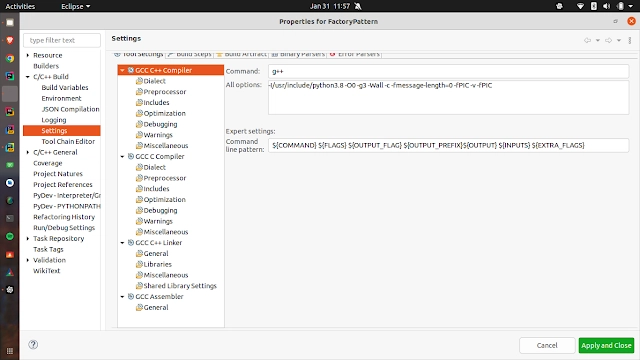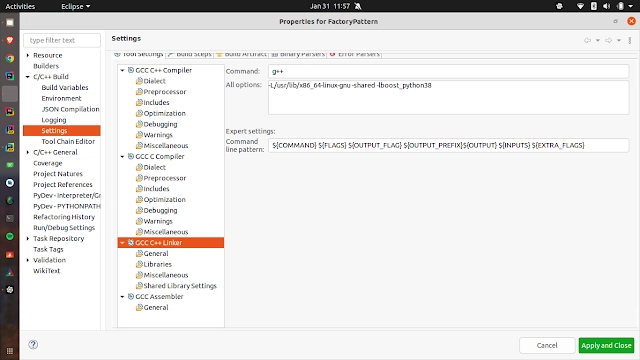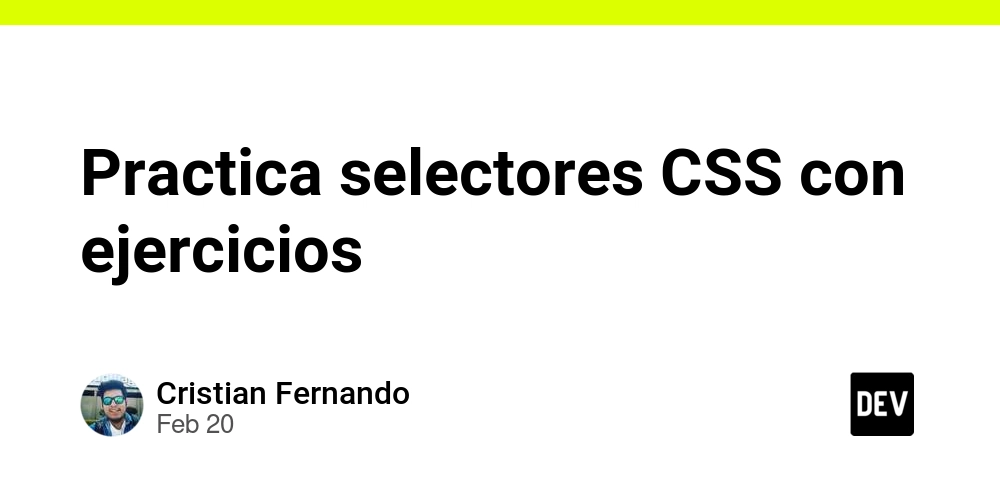Connecting C++ to Python using Boost.Python...
Many modern C++ applications provide a Python interface because it combines performance (C++) with ease of use (Python). Here’s why this trend has become so popular: ✔ It allows rapid prototyping. ✔ It combines speed (C++) with flexibility (Python). ✔ Python is popular in AI, ML, and scientific computing. ✔ Users can extend software via Python scripting. Boost.Python is a powerful library that enables seamless integration between C++ and Python. It allows C++ functions and classes to be exposed to Python, enabling direct interaction between the two languages. As I was playing around with Boost.Python, I made my existing Factory Pattern project written in C++ to expose itself to the python using Boost.Python library. The most important part is the following lines of code. This is kind of self explanatory - how we expose the C++ classes and methods to Python code. // Expose Singleton Factory to Python BOOST_PYTHON_MODULE(FactoryPattern) { using namespace boost::python; class_("Food", no_init) .def("getName", pure_virtual(&Food::getName)); class_("Biscuit") .def("getName", &Biscuit::getName); // Ensure Biscuit has getName class_("Chocolate") .def("getName", &Chocolate::getName); // Ensure Chocolate has getName class_("Factory", no_init) .def("getInstance", &Factory::getInstance, return_value_policy()) .staticmethod("getInstance") .def("makeFood", &Factory::makeFood, return_value_policy()); } Here's the complete source code of the C++ Factory Pattern... We will have to make a shared object (so) from this C++ project. /* * Food.h * Created on: Mar 10, 2021 * Author: som */ #ifndef FOOD_H_ #define FOOD_H_ #include using namespace std; class Food { public: virtual string getName() = 0; virtual ~Food(){ } }; #endif /* FOOD_H_ */ /* * Chocolate.h * Created on: Mar 10, 2021 * Author: som */ #ifndef CHOCOLATE_H_ #define CHOCOLATE_H_ #include #include "Food.h" class Chocolate: public Food { public: Chocolate(); virtual ~Chocolate(); string getName(); }; #endif /* CHOCOLATE_H_ */ /* * Chocolate.cpp * Created on: Mar 10, 2021 * Author: som */ #include "Chocolate.h" Chocolate::Chocolate() { // TODO Auto-generated constructor stub cout

Many modern C++ applications provide a Python interface because it combines performance (C++) with ease of use (Python). Here’s why this trend has become so popular:
✔ It allows rapid prototyping.
✔ It combines speed (C++) with flexibility (Python).
✔ Python is popular in AI, ML, and scientific computing.
✔ Users can extend software via Python scripting.
Boost.Python is a powerful library that enables seamless integration between C++ and Python. It allows C++ functions and classes to be exposed to Python, enabling direct interaction between the two languages.
As I was playing around with Boost.Python, I made my existing Factory Pattern project written in C++ to expose itself to the python using Boost.Python library.
The most important part is the following lines of code. This is kind of self explanatory - how we expose the C++ classes and methods to Python code.
// Expose Singleton Factory to Python
BOOST_PYTHON_MODULE(FactoryPattern) {
using namespace boost::python;
class_<Food, boost::noncopyable>("Food", no_init)
.def("getName", pure_virtual(&Food::getName));
class_<Biscuit, bases<Food>>("Biscuit")
.def("getName", &Biscuit::getName); // Ensure Biscuit has getName
class_<Chocolate, bases<Food>>("Chocolate")
.def("getName", &Chocolate::getName); // Ensure Chocolate has getName
class_<Factory, boost::noncopyable>("Factory", no_init)
.def("getInstance", &Factory::getInstance, return_value_policy<reference_existing_object>())
.staticmethod("getInstance")
.def("makeFood", &Factory::makeFood, return_value_policy<manage_new_object>());
}
Here's the complete source code of the C++ Factory Pattern... We will have to make a shared object (so) from this C++ project.
/*
* Food.h
* Created on: Mar 10, 2021
* Author: som
*/
#ifndef FOOD_H_
#define FOOD_H_
#include Here is the eclipse project settings...
and
And here's the python script to access the C++ methods.
import FactoryPattern
factory = FactoryPattern.Factory.getInstance()
biscuit = factory.makeFood("bi")
print(biscuit.getName()) # Expected: "Biscuit"
chocolate = factory.makeFood("ch")
print(chocolate.getName()) # Expected: "Chocolate"
Jai Hind... Jai Bharat...
By the way... there is another way to connect your Python code
to C++ - that is SWIG...










































































































































































![[The AI Show Episode 142]: ChatGPT’s New Image Generator, Studio Ghibli Craze and Backlash, Gemini 2.5, OpenAI Academy, 4o Updates, Vibe Marketing & xAI Acquires X](https://www.marketingaiinstitute.com/hubfs/ep%20142%20cover.png)



























































































































![[FREE EBOOKS] The Kubernetes Bible, The Ultimate Linux Shell Scripting Guide & Four More Best Selling Titles](https://www.javacodegeeks.com/wp-content/uploads/2012/12/jcg-logo.jpg)



![From drop-out to software architect with Jason Lengstorf [Podcast #167]](https://cdn.hashnode.com/res/hashnode/image/upload/v1743796461357/f3d19cd7-e6f5-4d7c-8bfc-eb974bc8da68.png?#)






































































































.png?#)




.jpg?#)































_Christophe_Coat_Alamy.jpg?#)








































































































![Rapidus in Talks With Apple as It Accelerates Toward 2nm Chip Production [Report]](https://www.iclarified.com/images/news/96937/96937/96937-640.jpg)










































































































































